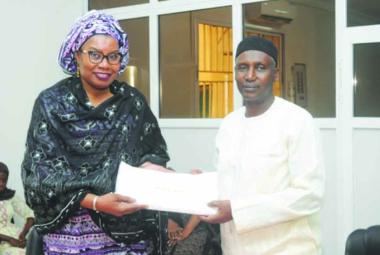By Awa Sowe
The Principal Trade Adviser for ECOWAP-USAID Project has pointed out that the failure of some member states to enforce the various protocols adopted by ECOWAS heads of state remains the biggest challenge to the free movement of people and goods in the region.
Justin Bayili noted this at a recently held two-day regional sensitisation workshop of stakeholders drawn from Customs and Excise, police, clearing agents, and e-farmers among others on ECOWAS Trade protocols, improved movement of people and goods across the region.
According to Mr Bayili, the region, has recorded more than fifty regulations on trade and transport but unfortunately, once the regulations are adopted by the heads of state some administrations are not able to enforce these regulations.
“The failure of these countries’ administrations to enforce these regulations that will allow the free movement of goods and people is what is affecting trade within the region,” he observed.
Mr Bayili consequently recommends the establishment of a common customs union to address these challenges confronting the ECOWAS sub-region.
He said customs union, is one regional integration area that whose implementation will lead to the free movement of goods and people.
Dr. Amadou Tall, representative of the ECOWAS Commission disclosed that irrespective of the challenging trade barriers, the sub-region is ahead of the others as far as free movement of goods and people is concerned.
He noted that the confab would equip the participants to be more prepared and abreast with the different existing protocols that can be exploited to add value to trading within the sub-region.
Dr. Tall highlighted key challenges including the amount of time spent at borders to get clearance, costs incurred by traders, and external tariffs under ECOWAS customs regulations among others.
Anna Menga Cham, Director of Fisheries also cited the importance of the forum that is designed to expose Gambian stakeholders to the various ECOWAS trade protocols and regulations. She said it is important for stakeholders to know and understand how to benefit from duty waivers and other incentives readily available that can in turn help them gain more profits in their trading.
She used the occasion to encourage Gambian entrepreneurs to be innovative and add value to their products if they are to hit the global market.
The Fisheries Director also called on Gambian businesswomen to grab the opportunities for the free movement of goods and people.
She noted that many business entrepreurs struggle to market their goods and services to Europe and America when they can trade within the sub-region with ease and more profits.






